 ☰ Menu
☰ Menu
 ☰ Menu
☰ Menu
Click to view Free Resources
Access free articles
Parent/Caregiver Support Resources
Join the SOS Referral List
Request SOS Presentations
Request Copyright Permission
Podcasts Featuring Dr. Kay Toomey
Click to view Resources Available for Purchase
SOS Handouts (Also available in Spanish and Chinese)
SOS Administrative Forms
The Great Food Explorer Music
Parent/Caregiver Libraries
Click to View Advanced Training
SOS Advanced Workshops
SOS Mentorship
SOS Certification
Click to View SOS Resources with Translation
SOS Handouts
SOS Advanced Workshops
- Feeding the Child on the Autism Spectrum, Feeding the 6-16 Month Old, Food Scientist - Adaptation of the SOS for the Older Child
Free 2-hour Parent/Caregiver Workshop
Click to view recommendations
Feeding Therapy Tools
Books
Websites & Organizations
Click to View Parent/Caregiver Support Resources
Free 2-Hour Parent/Caregiver Workshop
Picky Eaters vs. Problem Feeders Questionnaire
Does Your Child Need Feeding Therapy? Article
Parent/Caregiver Libraries
You have everything you need to implement the SOS Approach to Feeding with your clients included in your Conference Notebook, including the main PowerPoint slides, a reference list, and full-page handouts that you will copy and give to the families you work with. You will be well prepared to return to your professional practice and use the SOS program with these materials.
Because we have received so many questions about other handouts or forms we use in our practice, we have made two products containing additional therapeutic and administrative materials that you can choose to purchase separately from your registration fee.
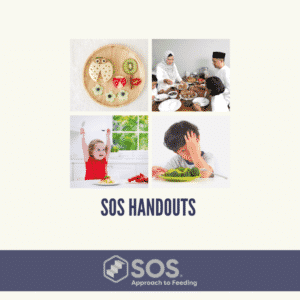
Over the past 30 years, Dr. Toomey has created 170 additional Handouts that she may use with the children and families that she works with. While you do not need these materials to use the SOS Approach to Feeding Program, you may find them helpful and interesting additions to your practice. These Handouts are available on a USB/Jump Drive that you can bring with you to your Clinic or your client’s home, so you can print out what you need at the moment. In addition, the current set of Handouts (2017) contains 61 NEW files from the previous revision in 2010, and all of the files have been updated to create a more uniform and usable format for your clients and families (the previous version was on a CD). These copyrighted handouts are in a PDF format as we want them to be used as written with your clients and families. If you wish to make any changes, prior written approval is required for copyright permission.
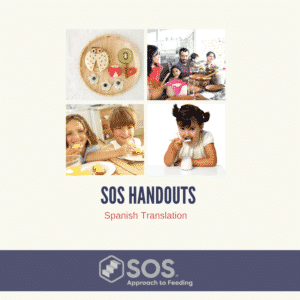
Available for Professionals who have attended a Basic SOS Approach to Feeding Conference, the SOS Handouts – Spanish Translation include over 160 handouts for Professionals to use and give out to parents during their clinical work with children with feeding difficulties. Each of these Handouts was specifically created over the past 30 years in response to requests from Families to address a certain topic/need or professionals who wanted a more structured way to provide materials for their parent education. The documents were professionally translated using a neutral version of Spanish, so Families and Professionals around the world now have access to the SOS Approach to Feeding Handouts.
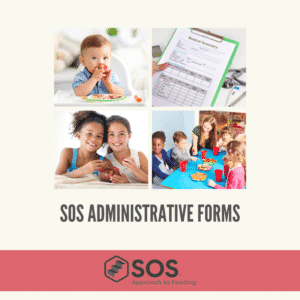
The Administrative USB/Jump Drive contains all of the various administrative/business forms that are regularly used in the Feeding Clinic to help our practice run efficiently (110 files). Dr. Toomey has starting Feeding Clinics in Hospitals, Rehabilitation Clinics, and Private Practices over the past several years. In doing this, she has developed billing grids as well as letters to Insurance Companies that you can use as a template to put your company’s letterhead on and send out to improve your reimbursement. There are also copies of our Full Team and Mini-Evaluation templates with 20 pages of “cut and paste” recommendations. Dr. Toomey has included on this USB, multiple Protocols that outline in detail the procedures to follow to make your Team and your Clinic run as efficiently as possible. There also are examples of Summary Letters for both Feeding Groups and Individual Therapy, as well as sample Group and Individual Therapy Progress Notes that you can use. These Administrative Forms are in a WORD format. You are encouraged to put your own logo/letterhead on the forms and change them as needed to include your client’s names and information.
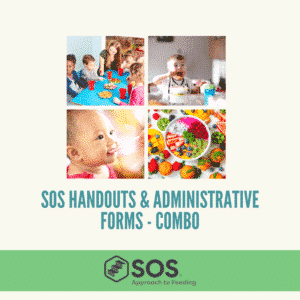
The Combo USB/Jump Drive includes all of the SOS Handouts (in English) and SOS Administrative Forms, and you get a discount when you purchase them together. This is our most popular item.
View the Handouts Table of Contents and the Admin Table of Contents
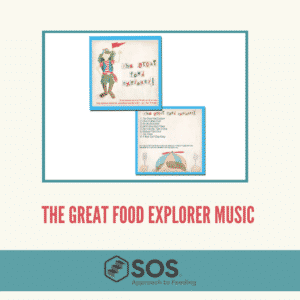
The Great Food Explorer is a phenomenal tool for helping change how ANY child thinks about food, for teaching them how to be more successful when trying new foods, and for enabling them to develop life-long healthier relationships with the nutritious foods their bodies need. Working with children’s musician, Coles Whalen, Dr. Toomey helped create original music to help Families and Therapists teach children about exploring, discovering, and enjoying eating food. There are eight brand new songs for children aged 18 months to 6 years of age, based on the principles of the SOS Approach to Feeding program.
Recommended use with families: After purchasing The Great Food Explorer!, we encourage you to lend it to your families for 1-2 weeks. Families are then asked to play the music for their child at least once per day (the car works well because the children are a captive audience!). After the lending period, the family would return the music to you. If the family would like to purchase a copy, they can order one from the website. By lending the music to families, it helps develop continuity between the home and therapy environments and encourages the child to have fun with food through music.
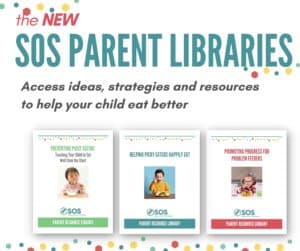
With SOS Parent Libraries, you have access to in-depth information to help you understand how every child learns to eat, why and when eating may get off track, and step-by-step strategies for overcoming feeding difficulties.
Each Library is geared toward a specific population of children.
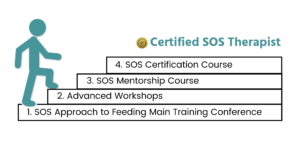
After completing the SOS Approach to Feeding Course, many professionals want to expand their knowledge of the use of the SOS Approach to Feeding to special populations. While you have the knowledge needed to implement the SOS Program with the children on your caseload, some find that additional information on special topics helps them better use the program with individuals with more complex feeding difficulties. To assist in getting all the right knowledge and resources you need to implement the SOS Approach to Feeding, in a way that makes the greatest impact for your patients, we have created several self-paced online workshops that cover these more specialized areas. Topics include:
The SOS Mentorship Program provides direct guidance and feedback by an SOS Professor on how to best implement the SOS Approach to Feeding program into your Clinical Practice. Developed for new SOS Practitioners and individuals interested in additional support in the implementation of the SOS Approach to Feeding program, the SOS Mentorship Program offers:
The first six sessions include Lecture and Video Case Presentations by SOS Professors, along with Group Activities, to further facilitate the course participant’s implementation of the SOS Program in their unique setting. Sessions 7-12 focus on Case Presentations given by each course participant with Clinical Reasoning Discussion with the SOS Professors to enhance each course participant’s SOS Feeding Therapy skills. Course participants will complete weekly homework assignments related to Session Topics and will receive direct feedback and personalized guidance.
Learn more about Program Costs, Schedules, Learning Objectives, and the Registration Process.
The Certification Program is a 12-week curriculum designed to provide current SOS practitioners with additional training, mentorship, and expertise in the implementation of the SOS Approach to Feeding.
Learn more about Program Costs, Schedules, Learning Objectives, and the Registration Process.
Enhance your Feeding Program and Clinical Practice with the new SOS Approach to Feeding Website & Membership Program.
Access information from trusted feeding experts to help your children develop a healthy, lifelong relationship with food.
Creating & Using a Chew Bin 2024 update
Request ‘canned’ SOS PowerPoint Presentations you can present
Request Copyright Permissions or Research on the SOS Approach to Feeding
The SOS Approach to Feeding offers the following translated resources and training:

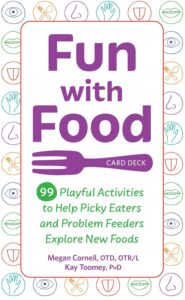
Based on the 32 Steps to Eating created by Dr. Kay Toomey in her SOS Approach to Feeding, this card deck is designed to help children enjoy a more varied and nutritious diet by inviting them to interact with food in playful and nonstressful ways. Featuring 99 activities, this deck will help parents and therapists guide kids through six main steps – visually tolerating, interacting with, smelling, touching, tasting, and eating new foods – all while engaging in imaginative food-based games, songs, challenges and art activities.
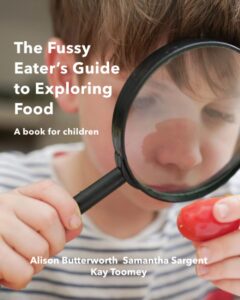
The Fussy Eater’s Guide to Exploring Food
Written by experts, this step by step guide for children and their parents is adapted from the SOS Approach to Feeding. By learning to be a food scientist, children discover the properties of different foods and eventually feel ready to taste and eat them. This book is great for the Level A Food Science children who are shifting between magical thinking and logical thinking.
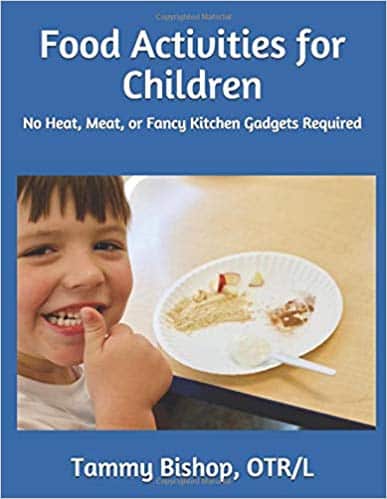 Food Activities for Children – No Heat, Meat, or Fancy Kitchen Gadgets Required
Food Activities for Children – No Heat, Meat, or Fancy Kitchen Gadgets Required
This kids cookbook includes ten recipes for simple, easy to assemble foods. Each recipe contains several pictures of children following the directions, as well as tips and tricks for adults. These activities are geared towards children ages 3-9 years and can be completed in about 30 minutes.
This series organizes over 30 basic kitchen skills into logical steps for families to follow, broken down into Beginner, Intermediate, and Advanced lessons. The videos are short, simple, and have real kids in them, which is great for our visual learners. The videos can also help older Food Science kids learn how to cook and be comfortable in the kitchen.
Raddish is primarily a subscription program that sends new cooking ideas straight to your door but also has tons of free resources, recipes, and cooking challenges. Membership includes a monthly cooking kit, digital bonus recipes and activities, and access to an online community. There are new themes each month, and they never repeat providing your families with lots of great, fun recipes to try. With each kit, kids learn culinary skills, create new recipes, collect an apron patch and kitchen tool, and gain valuable experience learning about a wide variety of foods as they cook!
Flat bottom, metal bowls are great for therapy – we use them for everything from using it to hide a food underneath, to catching our food as we blow it from our mouth. We also use these when it is time to clean up at the end of the session.
These utensils are great for kids who have trouble moving their wrist to scoop or poke food, then get it into their mouth. This company also makes other tools to hold paintbrushes or crayons and a toothbrush with the same handle.
These are another great starter spoon, as they hold just a taste of the puree. These are also great for older kids who are learning about purees.
These kid friendly knives and kitchen tools are a great addition to your therapy supplies, whether the child is at the visual and interacts with steps, or working on their oral motor skills. These utensils are also great for use at home to help them keep exploring new foods.
Cookie cutters are a great way to help a child engage with a new food, both at the lower Steps and when working on the body, face, and mouth steps. The small shapes also help with overstuffing since they tend to be the ‘just right’ size. We love using letters and numbers as well as simple shapes.
COGNIKIDS Products
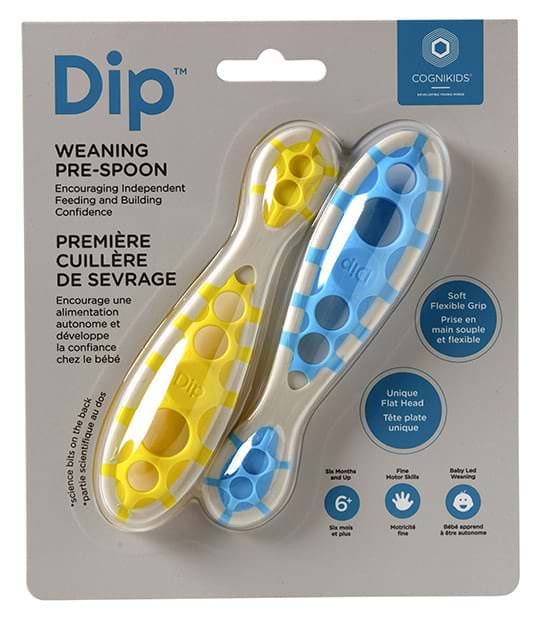 Dip supports early co-feeding with holes for child gripping and easy holding. Dip helps develop the pincer grip and builds muscles in the hand of children. This encourages independent feeding along with developing excellent hand-eye coordination and fine motor skills. There is also no right or wrong way to hold the spoon, which increases child success.
Dip supports early co-feeding with holes for child gripping and easy holding. Dip helps develop the pincer grip and builds muscles in the hand of children. This encourages independent feeding along with developing excellent hand-eye coordination and fine motor skills. There is also no right or wrong way to hold the spoon, which increases child success.
Sip supports early cup drinking with holes for child gripping and easy holding. Sip helps develop the pincer grip and builds muscles in the hand of children. This encourages independent feeding along with developing excellent hand-eye coordination and fine motor skills.
This is a great cup for introducing straws, as it allows you to gently squeeze the bottle to bring the liquid right to the tip of the straw so the child doesn’t have to do as much work to get the liquid out.
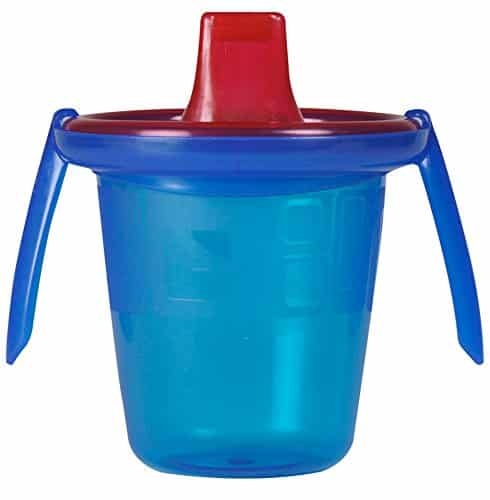 Take and Toss Sippy Cups with Handles
Take and Toss Sippy Cups with Handles
We like the Take and Toss Sippy cups because they do not have a valve in them, so they do not perpetuate the skills needed for bottle drinking. Additionally, some packs come with removable handles which make them a little easier to hold. Sippy cups (without no-spill valves) are a nice stepping stone on the way to open cup drinking, as it decreases the postural and motor demands of drinking from a cup (grading force to tip it just the right amount, maintaining posture while moving backward in space, etc.).
Most open cups are sized for big kids and adults and can be tough for young children to manage – the equivalent of you drinking your morning coffee out of a soup bowl. Tiny cups or shot glasses make a great first open cup for young children. You can put a tiny amount of water or other liquid in the cup, then model holding it with two hands, putting on top of your bottom lip, and tipping it up to take a drink.

Bite-sized Bravery: Susie’s Picky Eater Journey tells the heartwarming adventure of Susie as she bravely tackles her food aversions. With each step guided by courage and curiosity, Susie discovers the joy of exploring new flavors and textures.
Applesauce Grows on Trees shares a story about a boy who only eats three foods and his experience at Food School, where he learns that learning about new foods is FUN! This book is excellent for kids who can sit for a little bit of a longer story.
Ovis Has Trouble with Eating – Ovis is a sheep that is misunderstood by his family and his friends. He has sensory processing issues, which cause many challenges for him. But when Ovis gets some new ideas about how to cope from an occupational therapist, he gets back on track. This series also includes Ovis Has Trouble at School.
The My Tubey Series is excellent for kids with g-tubes. We have sent these books to school to help explain a child’s g-tube to their classmates. The series includes:
Strawbert’s Sensational Story tells a fun and interactive story that shows children eating doesn’t have to be scary, but rather an exciting multiple-step adventure, exploring and building a positive relationship with food. This book was written by a therapist who uses the SOS Approach to Feeding program. This book is excellent for school-aged kids.
Feeding Matters is the first organization in the world to unite families, healthcare professionals, and the broader community to improve the system of care for children with Pediatric Feeding Disorder through advocacy, education, support, and research. If you need assistance, these wonderful moms will personally call you.
Feeding Tube Awareness Foundation 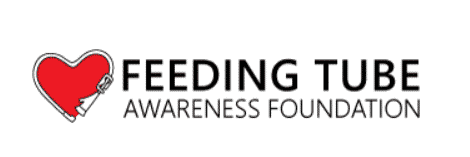
This website has tons of great information about g-tubes. It includes basic information about g-tubes, logistics of using a g-tube, troubleshooting common problems, as well as resources.
SJ Personal Healthcare Advocates
SJ Personal Healthcare Advocates is an advocacy firm specializing in the healthcare industry. SJ PHA works through the health insurance bureaucracy to ensure claims are paid timely and accurately. Their team of experts is ready to assist with all health insurance claim matters. They are located in New Jersey, but support families, healthcare providers, and employers around the country.
Established in 2006, Feeding Matters is the first organization in the world to unite the field’s leading advocates, experts, and allied healthcare professionals with the concerns of families to ignite unprecedented change in the system of care through advocacy, education, support, and research. Feeding Matters also created a standalone diagnosis for PFD, hosts the International Pediatric Feeding Disorder Conference, and developed the Infant and Child Feeding Questionnaire.
You may be interested in the following resources from Feeding Matters:
Since 1993 Feeding FUNdamentals, LLC has envisioned a world in which infants are provided with the most current, evidence-based neuroprotective feeding experiences, where parents are integrally involved as primary feeders. Erin Sundseth Ross, Ph.D. CCC-SLP, is the president of Feeding FUNdamentals, LLC, and the creator of SOFFI®, Supporting Oral Feeding in Fragile Infants.
Resources include:
The Fragile Infant Feeding Institute is a four-day intensive study of feeding and nutrition for infants with special needs. This course happens once per year around the US. Participating faculty represent a variety of perspectives from both research and clinical backgrounds, and provide evidence-based research with a focus on practical application.
This course expands the knowledge base of professionals caring for infants with feeding and nutrition challenges. The development of feeding skills and the impact of early nutrition and feeding experiences is discussed in the context of developmentally appropriate and family-centered care. The Institute provides a foundation for observation and assessment of developing feeding skills. Supportive interventions for infants while in the hospital, as well as during the transition to home, are addressed. The Institute places a special emphasis on feeding and nutritional issues through the transition to supplementary (baby) foods. The nutritional needs of premature infants and those with special medical needs, as well as the interaction between feeding skills and nutritional needs, are discussed. Presenters represent the disciplines of nursing, nutrition, therapy, parenting, and psychology. Each day successively builds on the knowledge and information from the previous day. An interactive process with the faculty results in the participant applying the information during the four-day Institute.
Don’t worry – we won’t fill your inbox!
Please note that you will need to upload a copy of your course certificate in order to be added to the Referral List.
Copyright SOS Approach to Feeding © 2024 | Web Design by Webolutions